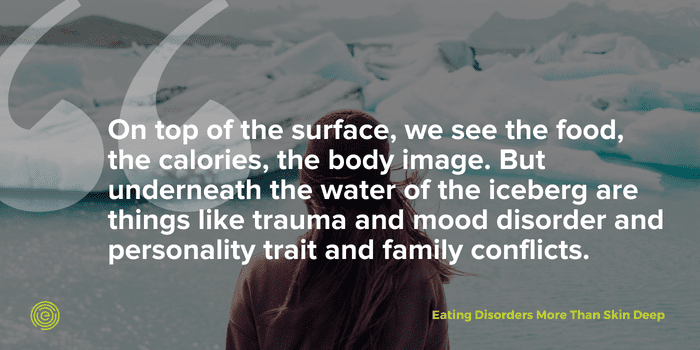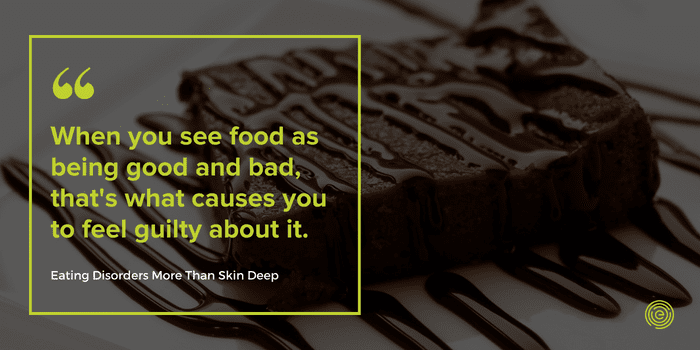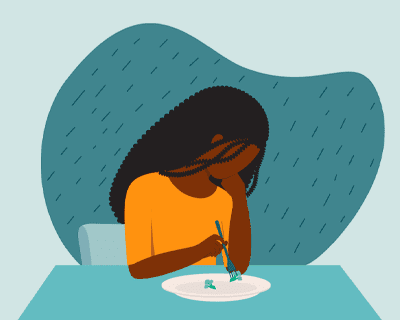The origins of eating disorders run deeper than vanity. So, what’s behind them? Dr. Kalam Sutandar, EHN Canada Psychiatrist in our Eating Disorder program, explains.
Eating disorders, including anorexia, bulimia, and binge eating, are commonly thought of as symptoms of poor body image and a desire to be thin. But there is more to it than that. Mental health issues can be the culprit, which can inform the best ways to treat eating disorders with long-term recovery.
But First, What is an Eating Disorder?
Eating disorders are psychiatric illnesses that have both psychological and physical impacts. Some examples are anorexia nervosa (which can include starvation, excessive exercising, binging and purging), bulimia nervosa (which can consist of binging and purging), and binge eating disorder (which includes eating large amounts of food in one sitting.)
“Typically, people who have eating disorders might be very preoccupied with body image. They may have a lot of weight and shape concern,” says Dr. Kalam Sutandar, EHN Canada Psychiatrist in our Eating Disorder program.
“They may value their weight and shape more than any other aspect of their life. So, maybe they know that their career, their relationships, and their hobbies are important, but really those don’t matter. Their weight and shape are the most important thing. They tend to see their body in a very distorted way. They may look in the mirror and see something different than what you and I might see.”

Dr. Sutandar also warns that you cannot always identify someone with an eating disorder based on appearances: “It might not be seen, and it might not be obvious. Someone who has bulimia could be at a healthy or higher body weight.”
What Causes an Eating Disorder?
With eating disorders, there are three types of contributors:
Biological contributors, such as a family history of obesity and mood disorder.
Psychological contributors, such as high perfectionism, excessive people-pleasing, agreeableness, low self-esteem, and low self-worth.
Environmental or social contributors, such as a childhood history of trauma, attachment disruptions, changing family dynamics, exposure to dieting at a young age, being female in a culture that values thinness, or being male in a culture that also has ideals about male bodies. People with eating disorders tend to also have depression, anxiety, trauma and PTSD, substance abuse. It doesn’t tend to stand alone.
“I think the misconception is that it’s about vanity. It only affects women. It only affects white women. It affects young people. I think that’s just the surface,” Dr. Sutandar says.
“It’s like an iceberg. On top, we see the food, the calories, and the body image. But underneath, there are things like trauma, mood disorder, personality traits, and family conflicts. All those things contribute to having an eating disorder. It’s complex.”

Are Eating Disorders an Addiction?
“I think that both are coping strategies,” Dr. Sutandar says. “I think some of the underlying risk factors can be similar, and both can be seen as ways of coping when you haven’t had an opportunity to learn healthier coping strategies.”
While acknowledging that eating disorders share some similarities with addictions, Dr. Sutandar also recognizes some key differences.
She says, “So some people would frame an eating disorder like an addiction, and in the way that I think it’s different is that, for many people, what they need to do with addiction is they need to learn how to abstain. However, you can’t abstain from eating. You always have to be eating food. So, that’s a different thing in terms of how you treat an eating disorder.
“I think also in terms of addiction, we’re looking at dopamine, the way substances affect dopamine in your brain. And in many eating disorders, it’s not really about dopamine in your brain. There isn’t that kind of a positive reinforcing effect that a substance has.”
How Can Eating Disorders Impact the Body and Mind?
The effects of an eating disorder are two-fold, causing damage to both the body and the mind.
On the physical front, an eating disorder can affect every organ system in your body. They can cause heart arrhythmia, heart attacks, and seizures. They also affect your electrolytes and gastrointestinal system, your skin. But it doesn’t stop there.
“Everything you’re thinking, it affects that as well,” says Dr. Sutandar. “They can cause a lot of distress to the extent that it changes your behaviour. It causes impairment in daily functioning. So maybe you’re unable to concentrate enough to go to work or go to school. They can have a negative impact on relationships. People with eating disorders often don’t socialize because socializing often involves food.”
These cognitive symptoms of an eating disorder on the brain can also hinder effective treatment. Dr. Sutandar explains, “If you’re starved, your brain is starved. If your brain is starved, your brain can’t think, it can’t feel, can’t make use of psychotherapy. Medications don’t work as well either. So, you have to get your body healthy before you can start working on your mind.”
Just how dangerous can an eating disorder be? Anorexia nervosa, for example, has the highest mortality rate out of any psychiatric illness, higher than depression, schizophrenia, and bipolar disorder. The mortality rate is between 5 and 20%.
“People die of starvation,” Dr. Sutandar says. “They die of the physical consequences of being very low weight, but they also die of suicide.”
Do Eating Disorders Only Impact Women?
Another misconception is that eating disorders only impact women, but more and more men are also struggling with them.
“We used to think that the ratio was something like 10:1, ten women to one man. But now we know it’s actually much higher. The ratio is more like 3:1.
“For many men, the ideals are more about a muscular body rather than a thin body. Even if they don’t have a diagnosable eating disorder, it still might be really harmful in some way. So, they might spend a lot of their time at the gym. They’re taking substances, medications, protein shakes, and things like that. They’re doing it at the expense of anything else. They might also be really unhappy with their body image. There might be some body dysmorphia.”
What Makes Eating Disorder Treatment From EHN Canada Different?
“We have a very inclusive and holistic approach to treatment,” Dr. Sutandar says. “I think that what’s really special about us is that we can treat the comorbidities, so we can integrate trauma and addiction treatment at the same time. It’s a very multidisciplinary approach. We have dietitians, nutritionists, psychotherapists, psychiatrists, plus getting medical monitoring so that you’re getting treatment in a safe, healthy way.”
“We’re also treating not only the behaviours but looking at what are the underlying factors. Helping with other psychotherapy techniques such as DBT and CBT to help people to understand the underlying emotion dysregulation.”
“It’s also all about food and moderation. There’s actually nothing that you need to stay away from because when you see food as being good and bad, that’s what causes you to binge on it or feel guilty about it. So that’s different.”

Our Eating Disorder program is for patients who:
• Are 18 years of age or older
• Meet current DSM-V criteria for an Eating Disorder and require structure and support in order to make changes to their eating, exercise, and/or purging behaviours
• Have a BMI of 15 or more
• Experience emotional or behavioural problems in home, community and or treatment settings and need a highly structured 24-hour therapeutic environment
Our evidence-based program model incorporates:
• Comprehensive residential treatment
• Evidence-based approaches including Cognitive Behavioural Therapy (CBT), and Dialectical Behavioural Therapy (DBT)
• Programming for positive mental health and self-image
• Meal planning and supervision to support normalized eating
Taking your whole life into account, during and after treatment, this program offers:
• Treatment with an interprofessional team of eating disorder experts including Psychiatrists, Registered Dieticians, Registered Psychotherapists, Social Workers, Occupational Therapists and Nurses
• Weekly individual therapy and daily group therapy
• Structured psychological treatment including nutritional rehabilitation and psychoeducation, and patient-specific physical health and wellness activities
• Access to our family program and family therapy to help your family heal
Ready to Take the First Step Toward Recovery?
Find out more about this program to see if it’s right for you or someone you know.
Visit ehncanada.com or call us at 1-866-963-6343




